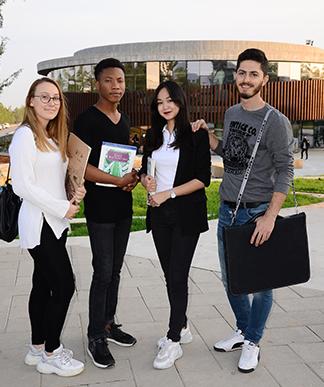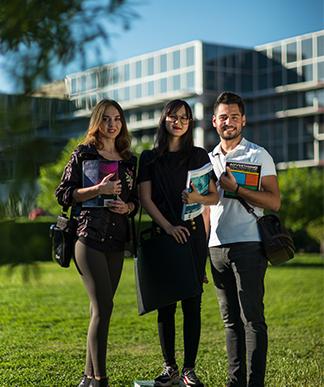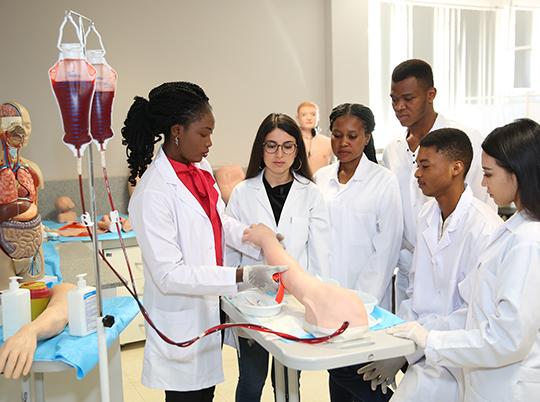


About the Program
As of 2021, the Master's Program in Nursing has started to provide education within the body of the Institute of Graduate Studies and Research at Cyprus International University. The program aims to train critical and research-oriented expert nurses, who have the skills of planning, organizing, supervising, developing, and expanding; can use knowledge, skills and advanced technology effectively in the understanding of quality service; can plan care based on research findings; follow scientific developments and use them for professional and academic purposes. In this way, graduates will be able to have more comprehensive knowledge about the field they would like to work for. Students who successfully complete a nursing or midwifery undergraduate degree and meet the requirements of the program can enroll in the postgraduate program. Within the scope of this program, students will have comprehensive knowledge regarding the profession through the selected area-specific courses. With research methods and statistics courses, the students will learn about research methods and skills.
Education Opportunities
At Cyprus International University, the Nursing Master’s Program with thesis is carried out both theoretically and practically. Theoretical education is provided in equipped classrooms on the campus while practical skills are taught in the skills laboratories of the department. In these laboratories, two adult manikins that allow basic nursing practices (vascular access, injection, tube application to the body cavities, etc.); a simulation manikin on which CPR can be performed; a pregnant simulation manikin for labor practice; a newborn care and application manikin; skeleton; anatomy model and other necessary materials used for nursing interventions. In addition to this, students gain practical skills for their field in different inpatient treatment institutions, public health institutions and rehabilitation centers. The program is run by three professors and three assistant professors. Additionally, academic staff from other departments also contributes to the programs. Students also benefit from the common library on campus which contains many printed and electronic resources.

Career Areas
Together with the socio-demographic changes in society, healthcare needs are also changing. Changes such as the increase in the elderly population, shortening of hospitalization periods, as well as the rapidly advancing technology require innovations in the provision of healthcare. Therefore, there is a need for nurses, who are equipped with advanced knowledge and skills in the field of nursing; and can provide individual and evidence-based care. The program aims to educate graduates who will respond to this need effectively. Graduates will have the privilege and advantage of benefiting from employment opportunities in all kinds of areas such as inpatient or outpatient treatment institutions, rehabilitation centers, and elderly-child-disabled care homes. In addition, graduates would have the priority for the position of an executive nurse in the clinics where they work. Graduates can also continue their doctoral education and become an academic in the nursing departments that provide undergraduate education.
Contact
Institute of Graduate Studies and Research
Graduate Sciences and Education Center, GE106
Tel: +90 392 671 1111 Extension: 2776
Institute E-mail: ciu-institute@ciu.edu.tr
Compulsory Courses
First Semester
RESEARCH METHODS
Course code
HESC501Credit
3Theoretical
3Practical
0Ects
8PATHOPHYSIOLOGY
Course code
NURS501Credit
3Theoretical
3Practical
0Ects
8Area Elective
Course code
NURS5X1Credit
3Theoretical
3Practical
0Ects
8Area Elective
Course code
NURS5X2Credit
3Theoretical
3Practical
0Ects
8Second Semester
SEMINAR
Course code
HESC590Credit
0Theoretical
0Practical
0Ects
4THESIS
Course code
NURS500Credit
0Theoretical
0Practical
0Ects
60CONCEPTUAL FRAMEWORK OF NURSING
Course code
NURS502Credit
3Theoretical
3Practical
0Ects
8Area Elective
Course code
NURS5X3Credit
3Theoretical
3Practical
0Ects
8Area Elective
Course code
NURS5X4Credit
3Theoretical
3Practical
0Ects
8Elective Courses
PUBLIC HEALTH NURSING
Course code
NURS508Credit
3Theoretical
3Practical
0Ects
7MEDICAL NURSING
Course code
NURS504Credit
3Theoretical
3Practical
0Ects
7INFECTIOUS DISEASES
Course code
NURS512Credit
3Theoretical
3Practical
0Ects
7EDUCATION AND TRAINING IN NURSING
Course code
NURS503Credit
3Theoretical
3Practical
0Ects
7NURSING PRINCIPLES AND PRACTICE
Course code
NURS514Credit
3Theoretical
3Practical
0Ects
8INTENSIVE CARE NURSING
Course code
NURS513Credit
3Theoretical
3Practical
0Ects
7SURGICAL NURSING
Course code
NURS505Credit
3Theoretical
3Practical
0Ects
7EMERGENCY NURSING
Course code
NURS511Credit
3Theoretical
3Practical
0Ects
7INTRODUCTION TO NURSING
Course code
NURS101Credit
0Theoretical
0Practical
0Ects
0INTERPERSONAL RELATIONSHIP
Course code
NURS108Credit
0Theoretical
0Practical
0Ects
0FUNDAMENTALS OF NURSING-II
Course code
NURS102Credit
0Theoretical
0Practical
0Ects
0DEONTOLOGY AND ETHICS IN NURSING
Course code
NURS302Credit
0Theoretical
0Practical
0Ects
0EVALUATION OF HEALTH
Course code
NURS207Credit
0Theoretical
0Practical
0Ects
0TEACHING IN NURSING
Course code
NURS307Credit
0Theoretical
0Practical
0Ects
0Students who are interested in pursuing advanced graduate studies leading to a master’s, doctoral degree, or professional doctorate degree for the Fall and Spring semesters every year. Applicants can directly apply online to our graduate programs using the application portal.
TRNC Applicants- Required documents:
- Bachelor’s Degree Diploma
- Bachelor’s Degree transcripts for each completed academic term/year.
- Documents to prove English proficiency for English language departments,
- Scanned copy of passport or identity card.
Click for detailed admission requirements information.
Students who are interested in pursuing advanced graduate studies leading to a master’s, doctoral degree, or professional doctorate degree for the Fall and Spring semesters every year. Applicants can directly apply online to our graduate programs using the application portal.
International Applicants- Required documents;
- Bachelor’s Degree Diploma
- Bachelor’s Degree transcripts for each completed academic term/year.
- Evidence of English Language competence: TOEFL (65 IBT) or IELTS (5.5). Students without these documents will take the CIU English proficiency exam on campus following arrival.
- Scanned copy of international passport/birth certificate
- CV
- Fully completed and signed CIU Rules and Regulations document (which can be downloaded during the online application)
Click for detailed admission requirements information.
Cyprus International University provides academic scholarships for its students as an incentive for success, with most students benefiting from 50%, 75% or 100% scholarships or discounted tuition fees. Click for more information.
Tuition Fees are determined at the beginning of each academic year. Candidate students who are entitled to enroll in CIU can learn their fees in line with the Tuition Fee Calculation system.